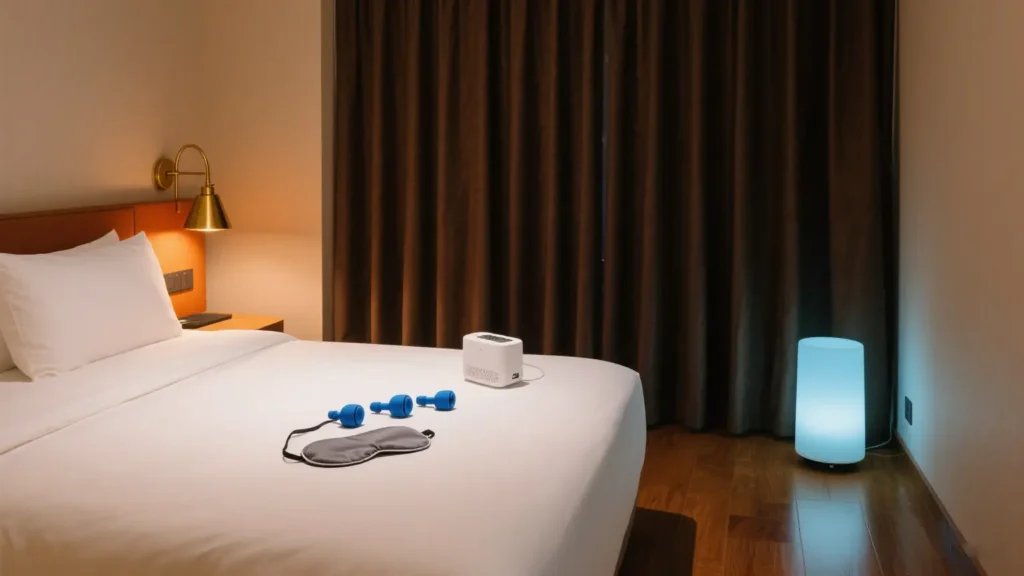Jet lag has the potential to drastically turn your exciting travel adventure into a nagging ordeal, leaving you with disrupted sleep, drained energy, and less fun. However, by leveraging the right strategies, you can get rid of the trouble that jet lag brings and make a seamless move to the time zone of your destination. Below is a list of some expert- recommended pieces of advice to help you avoid jet lag while traveling.

Understanding Jet Lag
Jet lag is a condition that can emerge as the change of your body’s internal clock or the circadian rhythm object caused by traveling over multiple time zones. The biological clock is in charge of some primary functions such as sleep-wake cycles, hormone production, and metabolism. When you get to a different time zone all of a sudden, your body is not able to relax and adjust, thus getting signs that become like in the case of fatigue, insomnia, irritability, and digestive problems. There was a survey reported by the World Health Organization that the crossing of more than three time zones might make you experience the symptoms of jet lag and that they tend to get even stronger as you pass more time zones.
Pre-Trip Preparations
Adjust Your Sleep Schedule in Advance
One of the most efficient strategies to combat jet lag is to start adjusting your sleep schedule a few days prior to your trip. Let’s say that you head toward the east; then you are supposed to start your bedtime and waking-up time earlier every day a few days before attending your trip. For example, if the time difference is six hours, then it is better to change your bed and wake-up time one hour earlier every day for four days. In case you are about to head towards the west, you could simply start by delaying your sleep and wake times gradually. In this way, your body registers minimal impacts if you adapt the time zone changes quite old before boarding the aircraft.
Learn About Your Destination’s Time Zone
Find out the time difference between the location from where you are going to the one you are travelling to. One of the options you can use is applications or websites that can easily determine the changes in time and thus it makes one mentally prepared as well. Being aware of the time in advance will help you not only with planning on the ground activities but also with the time of meals and even sleep.
Be Well Hydrated in Advance
Without question, dehydration worsens jet lag signs and symptoms. A few days before your trip, you should start drinking lots of water. Steer clear of too much alcohol and coffee because they can cause dehydration and disturb your sleep. Aim at drinking at least 8-10 glasses of water per day to stay in good health, and thus you will be in a much better position to deal with the hazards of travel.
Strategies to Use While Flying
Control Your Diet on the Plane
Food and drink consumption in the aircraft are very important in preventing jet lag. Refrain from consuming rich, greasy, and salty foods as they tend to make you uncomfortable and heavy. Instead, it is advisable to partake in meals that are both balanced and provide the body with power. This means that one is supposed to eat foods containing complex carbohydrates, lean proteins, and good fats. For instance, one can easily go for fish salad, a whole-grain sandwich, or a mixed pack of fruit and nuts or one can also go for green vegetables.

Opt for Sleep if You Are Able
It is possible to arrange a convenient sleeping atmosphere during the trip. The things will allow you to have an uninterrupted sleep when needed: an eye mask will help to block out the light, noise-canceling headphones or earplugs will block the noise, and a neck pillow will provide support. Try to synchronize your sleep with the time of your destination. If you are flying at night your time, do your best to sleep and if you are flying during the day, remain awake and take part in activities such as reading, watching a film, or stretching.
Take regular breaks and do the exercises. The fact that you do not move for a long time and that you are sitting in a confined space does not allow for proper blood circulation in your body, which in turn makes you feel stiff and tire quickly. It makes sense. Thus, when you repeatedly take a stroll up and down the plane’s aisle, practice yoga in your seat, and carry out gentle exercises like ankle rotations and shoulder rolls, you are in effect carrying out a series of actions that will go a long way in allowing blood to circulate freely in your body, which at the same time contributes to the reduction of swelling and the increase of energy level making all stages of jet lag quite bearable.
There is no doubt that the use of a confined space for a period of time causes the display of symptoms such as fatigue and stiffness in the body. It is not uncommon to have the situation described in the question statement, and thus, when you decide to do some light exercises, make tea, or prepare some healthy snacks, it is beckoned that you will most likely feel energized enough to face the world.
Just the fact that you are sitting in one place still and doing no exercises which helps in the utilization of the blood that is available for it reached each part of the body and can do wonders for the dry and stagnated climate that causes the stiffness and weariness to be removed by initial flow of the blood and the restoring of the good time thus taking time up to the end moment (all the three conditions) of the cycle and thus removing the system power source shortcomings are the usual results of not doing exercises.
A long way to allow blood to flow in the body, reduce swelling and elevate energy is to have a physical workout, and all of that helps to be a participant of jet lag.
Post-Arrival Adjustments
Adapt to the Local Time Immediately
As soon as you reach your destination, adopt the local time. Ensure you spend much of the time in the sun as the sun naturally regulates your internal body clock. Walk outside, eat local food, and enjoy day activities. Do not sleep during the day unless you find it so necessary that it can be done flexibly in a short period i.e.in between 20 to 30 minutes. A very common feature of a world where people travel on a daily basis is that a lot of them go for a walk, have a meal, and get involved in an activity without necessarily thinking that if they do so, they will be able to easily adjust to a different time.
Prioritize Sleep
You need to get sufficient quality of sleep to get on top of jet lag. Make your sleeping place cozy and comfortable in the hotel room. By using blackout curtains, you can prevent any extra light from getting in, setting the right room temperature, and a white noise machine if the sound in that area is not of your liking.
Moreover, adopting a regular bedtime routine( e.g. taking a warm bath, reading a book) can be a clear signal to the brain that it is the time to rest.

Natural Remedies and Aids
Incorporate Sleep-Promoting Foods
There are certain foods that are known to soothe and improve your sleep. One way is to consume more foods that are rich in tryptophan, such as bananas, warm milk, turkey, and oats. Tryptophan is a vitamin that helps our body produce serotonin, a neurotransmitter that regulates mood and sleep. Furthermore, foods with a high content of magnesium like nuts, seeds, and leafy greens can also help you feel relaxed and improve the quality of your sleep.
Consider Supplements
Melatonin naturally regulates the sleep-wake cycle of the body. By using melatonin supplements, partakers believe that they can adjust to their new time zone more easily. Nonetheless, it is crucial to get in touch with a specialist before using melatonin or any supplements, especially if you are suffering from an ailment or are already on other medications. Besides, some other supplements like valerian root and chamomile also have sedative effects and are thus considered good for sleep.
Utilize Aids and Tools
Techniques that can boost your sleep and comfort during your journey are an investment that will change your lifestyle. A portable white noise machine is definitely a good investment as it can provide a continuous soothing sound that will help you fall asleep faster. Blocking out sounds of distractions, by using an eye mask and earplugs, would be the perfect way to help you get the most amazing sleep. Some people, however, find that light therapy devices are also very successful. These devices can effectively help in resetting the circadian rhythm as they use the same light that is found in the natural sunlight.
FAQs About Avoiding Jet Lag
How many days prior to the trip should I start the adjustment of my sleep schedule?
It is recommended to modify your sleep pattern 3-4 days prior to your trip as it is the most effective way. Still, even if you make minor changes anywhere from 1-2 days in advance, it can still help your body to better adjust to the new time zone.
What is the most appropriate amount of melatonin for dealing with Jet lag?
Melatonin dosage can actually be quite different for everyone. The most usual recommendation is between 0.5 and 3 milligrams 30 minutes to an hour before bedtime for an adult, which is the lowest dose. Still, the best decision is always based on a doctor’s opinion.
Fully implementing the above recommendations makes it possible for you to drastically decrease the problem of jet lag and not only benefit from your trip but really enjoy it. Furthermore, every person may have diverse experience, so do not be afraid to tailor-fit these tips to your comfortability. A little effort and foresight will help you level up from being jet-lagged to fully embracing your journey to the world.